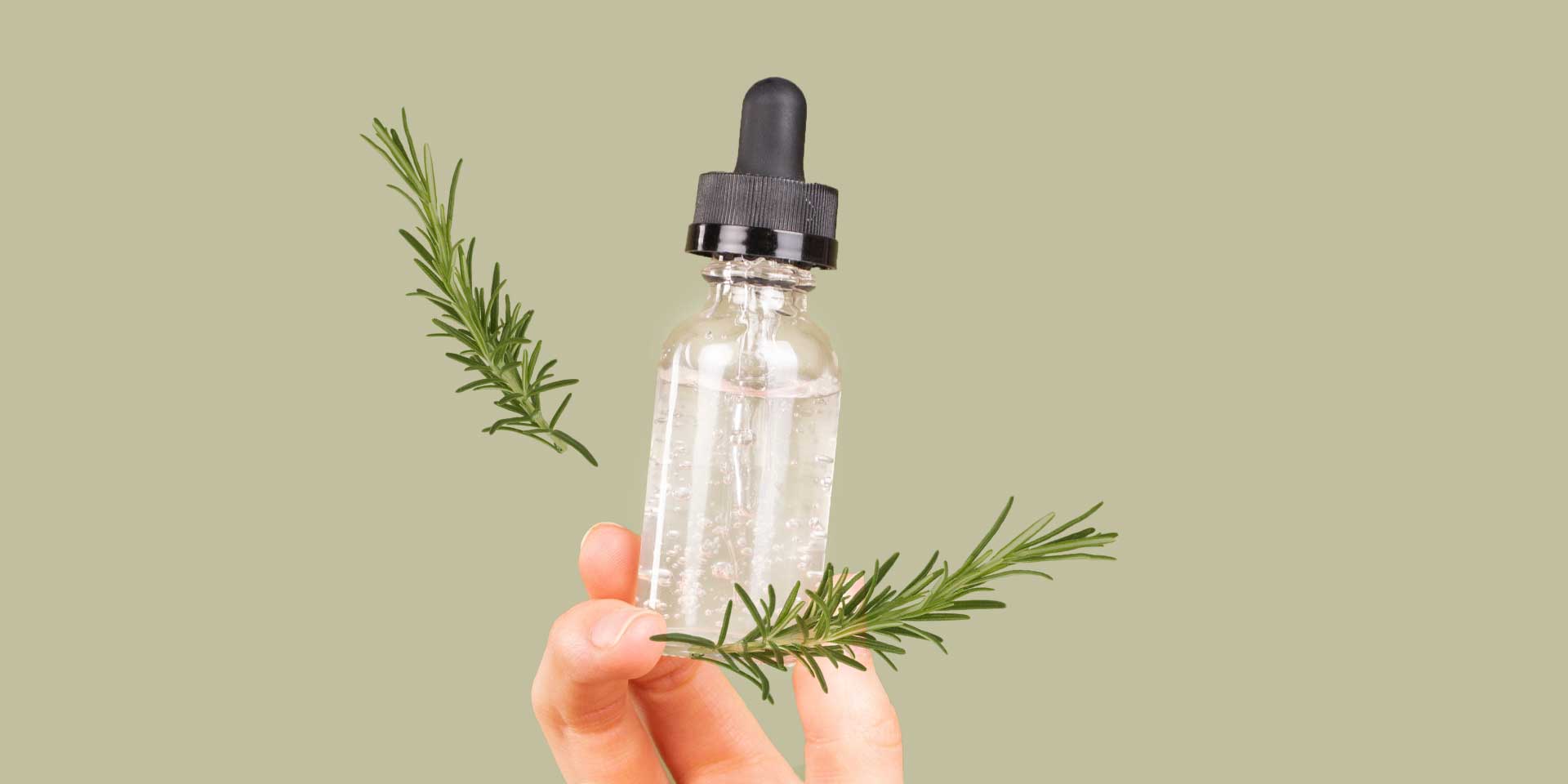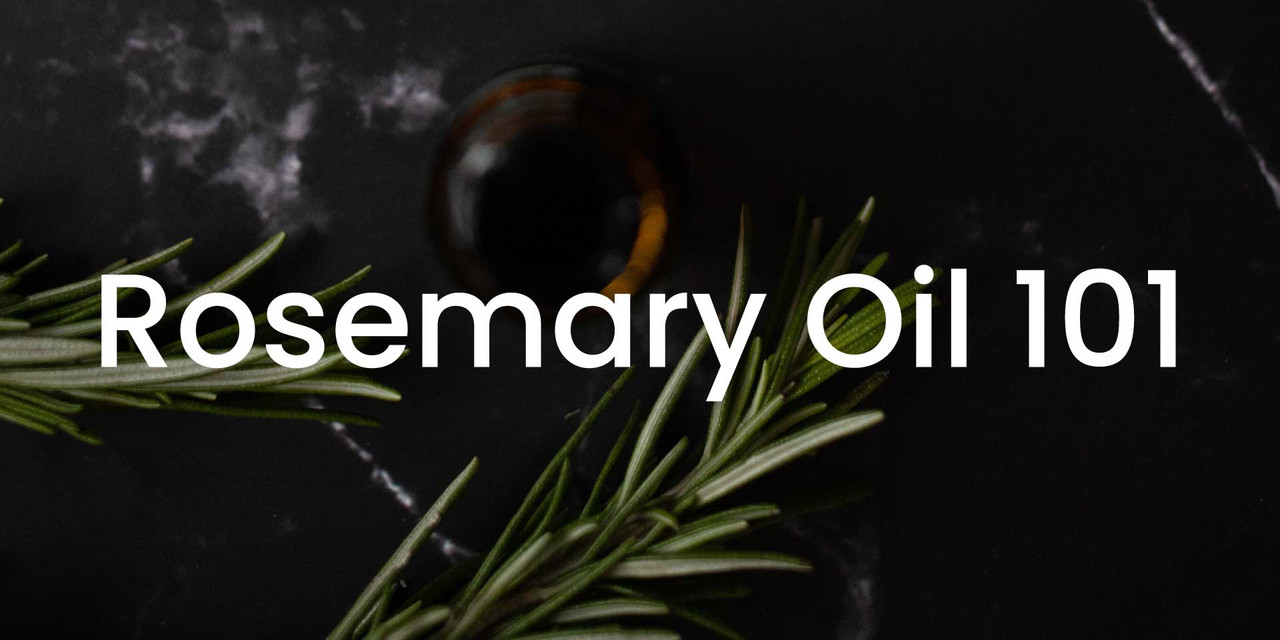Rosemary Oil 101: All your questions answered
Essential oils have taken the world by storm. Whether it's for relaxing, aromatherapy, or skincare, essential oils come in a variety — each of which house their own unique array of benefits. One of the most popular to date, especially for hair growth, is the beloved rosemary oil. Not sure if it's right for you? This blog will answer all your questions!
What is rosemary oil?

Rosemary oil is essentially an oil extracted from the core components of the rosemary plant by being distilled with steam extraction methods. The rosemary plant is a herb with needle-like leaves native to the Mediterranean. Because of its taste, it's used as a condiment with meat, and is a good source of iron and calcium among others. As an essential oil, it is stored and sold in small bottles.
It can be used in diffusers for aromatherapy benefits, while it can also be applied on the skin as well as poured in during your bath. Lastly, just like the herb, it can be used to improve the taste or add flavour to certain foods.
What are the benefits of rosemary oil?
Rosemary oil comes with plenty of benefits, especially medicinal ones due to its properties. Since it’s an expectorant, when its pleasant, herbaceous aroma gets inhaled, one can expect relief from throat congestion due to allergies, cold or flu. However, it also provides therapeutic and health benefits as well based on a number of studies.
Here are some of the various benefits rosemary oil can provide:
- Can reduce fatigue and tension
- Can combat acne
- Can improve brain function and memory
- Can help with hair growth
- Can improve the taste of your food with a few drops
- Creates a relaxing and soothing environment through aromatherapy
- Can increase blood circulation
- Can reduce inflammation of joints
- Can help protect against sun damage
- May fight against cancer cells
- May activate antioxidant defense mechanisms to protect the liver
- Can increase effectiveness of antibiotics
It should be noted that while there are studies highlighting the effectiveness of rosemary oil when it comes to these benefits, there is no definitive scientific evidence to support many of them.
Does rosemary oil have any side effects?

Rosemary oil is safe for the most part. If you’re ingesting it by mouth, make sure you’re only consuming the actual rosemary herb and in limited quantities. Taking large amounts of the rosemary leaf is unsafe and the same goes for undiluted rosemary oil, both of which are said to cause vomiting, sun sensitivity and redness on the skin.
If you’re applying rosemary oil on the skin, it should be relatively harmless, though, there’s always the possibility of one experiencing an allergic or adverse reaction since everyone’s skin is different. If you’re unsure, perform a patch test or gradually introduce rosemary oil onto your skin or scalp as opposed to applying it daily.
Finally, if you’re inhaling rosemary oil as part of an aromatherapy session, there should be no problems experienced. As always, if you are experiencing any symptoms or reactions following use of rosemary oil, refrain from further use and consult a doctor immediately.
Who can use rosemary oil?

Rosemary oil is safe for most to use. However, in general, it is recommended to avoid rosemary oil if you’re pregnant or dealing with epilepsies or high blood pressure as it can exacerbate those particular conditions. In addition, it’s also recommended that any child under the age of four refrain from using it.
Does rosemary oil help with hair loss?
One of the biggest reasons rosemary oil has spiked in popularity in recent years is the fact that it is said to help with hair loss. Since rosemary oil can help improve blood circulation, if you apply it on your scalp, you can potentially stimulate new hair growth in your balding areas while preventing further hair loss.
However, one of the biggest causes for optimism was a 2015 study that compared the effectiveness of rosemary oil to minoxidil, an effective hair regrowth treatment more commonly known by its brand name of Rogaine. The study, which tested subjects with DHT-related hair loss over a period of six months, concluded that rosemary oil was slightly more effective than minoxidil in hair growth. While the difference was not statistically significant, it was big news nonetheless as it allowed those with hair loss to try rosemary oil as opposed to minoxidil which comes with a number of side effects.
It should be noted that this was only one study and more research is required to determine if rosemary oil truly is a hair regrowth option. If you do decide to apply rosemary oil on your scalp, make sure to dilute it with water or your favorite carrier oil first so as to avoid irritation.
What are the best rosemary oil products?
If you’re interested in trying out rosemary oil for its wide range of benefits, we’ve got you covered with some product recommendations.
Maple Holistics Rosemary Essential Oil - Whether it's for your diffuser or to be combined with your skincare or haircare products, reap the benefits of Rosemary and its energizing scent with the Rosemary Essential Oil offered by Maple Holistics.
Mielle Organics Rosemary Mint Scalp & Hair Strengthening Oil - Further highlighting the benefits of rosemary oil when it comes to the scalp and hair, this product is packed with a number of other nutrients in a biotin-infused formula to help nourish and strengthen the hair follicles.
PUROLEO Rosemary Essential Oil - Another great option if you’re looking for 100% pure and undiluted rosemary oil for aromatherapy or DIY products.
When it comes to essential oils, rosemary oil is up there as one of the best. It provides a heap of benefits, can be used as a condiment for food, and not to mention, smells very good. Whether it’s for your diffuser, bathtub, or skin, you can’t go wrong with this particular essential oil.



